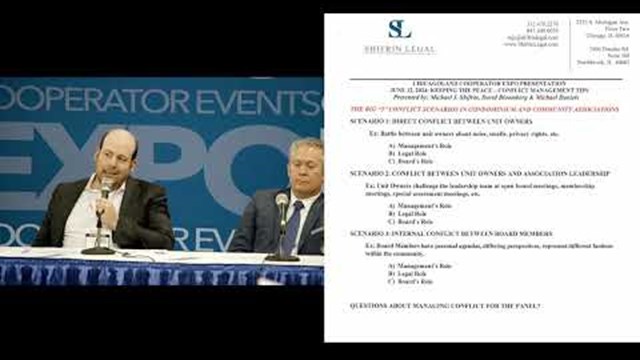At the heart of volunteerism is the notion of doing something for the common good. For many, choosing to live in a co-op or condo community is also choosing to volunteer for board service, helping to guide and govern the community they call home. But with that impulse to serve the common good lurks the possibility of liability - a concern that stops many from wanting to participate in the governance of their building or association. Fortunately, that’s where directors and officers - commonly called simply D&O–insurance comes in.
What’s D&O?
In a nutshell, directors and officers insurance is a form of liability coverage that indemnifies - protects, in other words - the board members of a corporation or association against losses or advancement of defense costs in the event that a decision made in good faith by the board or board members results in damages of some sort.
“D&O protects officers for their decisions - and indecisions,” says Cindy Fitts, an accounts executive with Condo Insurance Specialists of America (CISA) in Elgin, Illinois. “Board members are exposed to liability every day carrying out the business of the association, from paying bills to replacing systems to hiring janitorial staff. We know the business is complicated and cumbersome, which is why many boards hire management companies. In Illinois, managers are also required to be covered by D&O policies. It protects officers for their volunteer fiduciary responsibilities as board members. It will not cover willful negligence or intentional fraudulent acts.”
Mark Hakim, an attorney with New York City law firm Schwartz Sladkus Reich Greenberg Atlas adds that D&O is not carte blanche for boards to act with impunity. That bit about ‘decisions made in good faith’ is very much key. “Each such officer or board member may be held personally liable for actions not taken in good faith, or taken outside the scope of their duties,” says Hakim, “including but not limited to discrimination, self-dealing, retaliation, etc. D&O insurance coverage is generally only afforded if the alleged conduct of the board member or officer was within the scope of their duties, performed in good faith, and without gross negligence.”
Within those parameters, Hakim continues, “The importance of D & O insurance cannot be overstated. The presence of such insurance permits members or officers, each of whom are unpaid volunteers, to freely participate in corporate governance without fear of personal liability for merely exercising their jobs in good faith. It is difficult at times to get people to serve on boards, and absent this protection, it would be even more difficult. D&O is not a luxury —it’s a necessity when serving on a board.”
Jay Dixon, a senior director with OnePoint Insurance, a national insurance brokerage with offices in New York City, says, “Directors and Officers Insurance and Employment Practices Liability Insurance (EPLI) are crucial parts of the insurance plan for boards of cooperatives and condominiums. These coverages provide financial protection for board members, officers, and volunteers against claims and financial risk if they are sued for decisions made and/or actions taken while performing their official duties. This coverage is essential because board members can serve without fear that their personal assets, like savings or property, will be at risk due to lawsuits related to their board activities. D&O encourages participation in the community, because board members and prospective board members know they are protected. More residents are likely to volunteer for board positions, ensuring the cooperative or condo has qualified and willing leaders.”
In the absence of D&O coverage, should a board member be sued as a result of a good-faith decision or action taken in the course of their duties and lose, they would have to pay for those damages and fees out of their own pocket. According to one legal pro, “In today’s world, the fact that someone sues you is very serious. You have to defend yourself, and the legal fees are substantial. Board service is voluntary, so people won’t run if they are afraid they will get sued and they have to defend themselves out of their own pockets. D&O pays those legal fees.”
“Board members often think their homeowners policy will extend to this protection,” warns Fitts, “but it won’t; there’s no other insurance that will protect volunteers on boards besides D&O. It covers lawsuits filed by anyone against a board for various reasons based on their decisions. In Illinois, other liabilities, for example, don't fall under the property or general liability coverage. D&O fills in the gaps in other insurance coverage.”
What’s Covered & What’s Not
Almost any decision made by a board can potentially lead to allegations of breach of fiduciary duty, mismanagement, or employment practices violations. For example, decisions such as not approving a potential buyer in a cooperative, terminating a contract with a vendor, or an employee's dismissal can expose the board to legal liabilities and lawsuits. “D&O insurance helps mitigate the financial risks when lawsuits do arise,” says Dixon. “Legal defense costs, settlements, and judgments can be financially devastating, and D&O insurance covers these expenses, protecting the co-op or condo’s financial health.”
Again, however, Dixon makes clear that “While D&O insurance is fairly comprehensive, it typically does not cover fraud and criminal acts, intentional illegal acts, or fraudulent activities, personal profit claims related to directors or officers gaining personal profit to which they were not legally entitled, bodily injury and property damage.” It also does not cover “claims involving physical injury or property damage, which are usually covered by general liability insurance. Pending and prior litigation, as well as claims related to legal actions that were known before the policy inception are also not covered.”
Hakim concurs. “D&O insurance will generally defend and/or cover the expenses of a defense in connection with a claim against a board member or officer, however only to the point it is, if at all, determined that the board member or officer did violate a law or otherwise breach their fiduciary obligations,” he says. “Simply stated, you cannot purchase insurance that would cover you for an illegal act.” Provided a board member or officer can demonstrate that their actions/decisions were made in good faith, in the interests of the corporation/condo/HOA, generally their actions are covered by what is commonly known as the Business Judgment Rule, and D&O insurance would cover these decisions/actions.”
Coverage Amounts & Other Pertinent Points
The cost of D&O coverage varies, depending on the underwriter, the size of the building or association in question, and its claims history, so like any service it's best to shop around and compare packages before signing on with a new carrier. Policy premiums and retention amounts also vary by state and jurisdiction. The premium for a D&O policy on a 200-unit co-op in Manhattan is more than it would be for a suburban 200-unit HOA in Elgin or Shaumburg, Illinois, for example. Pricing is governed by the nature of risk, and limits are provided and can be guided by a community’s governing documents, which may dictate how much coverage the community must carry.
According to Dixon, “Every board should have D&O insurance; the governing documents of the association normally mandate it. There is never a reason for a board to be without this coverage. It is absolutely essential. We typically advise our clients to secure $1 to $2 million in D&O coverage with ‘defense costs outside the limits.’ This means the costs of defending a claim do not reduce the actual limit available to pay the claim. Some excess liability and umbrella policies can include D&O coverage, providing additional limits for D&O claims.”
A Word on Fidelity Bond Coverage
One other item worth mentioning in conjunction with D&O coverage is what's called fidelity bond insurance. Like D&O, it covers the association and board in the event that a building or HOA employee acts illegally and incurs legal damage. The bond is obtained by the co-op or condo as part of its insurance package, and ensures that any losses incurred by the bonded individuals are covered by the bonding company.
“In Illinois, associations with six or more dwelling units must obtain a fidelity bond for its employees including the property manager,” says Nancy J. Ayers, CPCU, CIC of Alliant Insurance Services in Chicago. Ayers says the buildings need to purchase a limit that will cover their maximum amount of exposure to cover funds in the custody and control of the association.
The cost of the fidelity bond is dependent on the limit purchased and the number of employees covered. Some property and liability policies may include a small limit of fidelity coverage as part of their policy. A few of the insurance carriers also offer multiple coverages within their financial services policies, Ayers says.
“Your choice of D&O and fidelity are significant,” says Jon Schildt, a managing principal of Calculated Risk Advisors, LLC in Chicago. “Since the Illinois Condominium [Property] Act requires associations to carry D&O and fidelity insurance, many associations buy without knowing what it covers, or else do not even realize they need to purchase it.”
That’s not a good idea. These are two of the most important insurance policies purchased for your building association so it’s incredibly worthwhile to spend time researching them beforehand.
Fidelity bond insurance protects boards and other building administrators from malfeasance carried out by building or homeowner association staff members. New Federal Housing Administration (FHA) requirements now provide that condos must have this insurance—so not only must boards consider it—but they must research it, purchase it and renew it.
“Fidelity coverage is one of the most neglected and misunderstood areas of insurance for an association, says Karyl Dicker Foray, CIRMS, CISR, an insurance broker for Rosenthal Brothers, Inc. in Deerfield, Illinois. “This type of coverage is also known as employee dishonesty coverage or crime coverage. Having three different names doesn’t help the matter, and often, insurance agents use fidelity, crime and employee dishonesty interchangeably, just to confuse the matter further.
It’s Required
The first thing to understand is which buildings in Illinois are required to carry fidelity bond insurance. “As for fidelity, buildings with six or more units are required to carry crime/fidelity equal to the amount of funds under their control at any one time plus reserves,” Schildt says. “The policy must also cover the building manager if there is one.”
If you take that one step further, the rule of thumb as to how much fidelity coverage to buy is three times an association’s total monthly assessments plus the amount in your reserve fund, Foray says.
Even if fidelity coverage isn’t required for your condo or townhome, it’s strongly advised. “Just like any other business, your assets need to be protected from unexpected loss the same way you protect yourself from fire or a slip and fall loss,” Foray says. “Locally, Chicago has certainly seen their share of fidelity bond claims over the last five years.”
Directors and officers and fidelity coverage may be sold as separate policies or combined under one policy with separate coverage parts. According to the pros, the majority of buildings opt to get D&O coverage and fidelity bonds as separate policies. The reason for this is that if you get them as part of a larger policy, you risk what's called 'erosion' in insurance jargon. For example, if you buy a $100 million total insurance policy with general coverage and D&O drawing from the same benefits pot, and your building finds itself filing a huge claim in the wake of a hurricane, that claim will likely eat up the entire allotment, leaving nothing to cover any subsequent claims made against how the board handled the storm repairs.
D&O insurance is critical for all shared interest communities, and serves more than one purpose. While there to protect decision makers, it’s also there to mitigate the concerns of those same decision makers about their personal liability when stepping forward to volunteer. It’s the peace of mind that makes volunteer service possible.
A J Sidransky is a staff writer/reporter for CooperatorNews, and a published novelist. He may be reached at alan@yrinc.com.










Leave a Comment